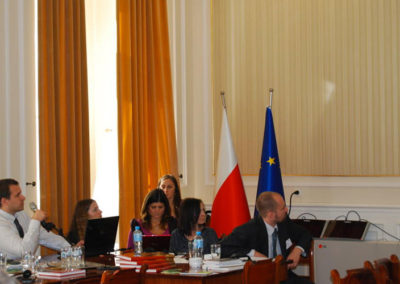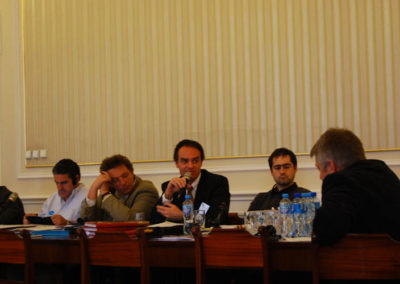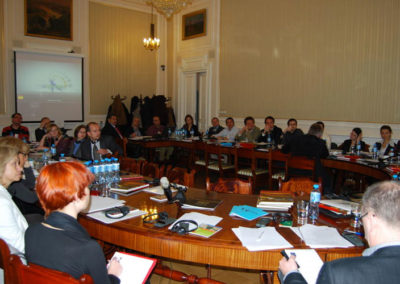A half-way stage of implementation of the current 2007-13 Structural Funds programming period and the ongoing debates within the European Commission and the Member States on the future of the EU financial framework make this momentum relevant for EURoma to contribute with proposals to the new Structural Funds Regulations 2014-2020 with the aim of increasing the effectiveness and impact on Roma inclusion.
EURoma network members met in Cracow –Poland- last 21st of October within the framework of the Management Committee in order to reflect on how to make a better use of European funds based on a questionnaire; main topics addressed were: a) strategic approach that this funding should incorporate, b) ensure the effectiveness of the Structural Funds for Roma inclusion, c) monitoring and evaluation systems, among others.
In order to agree on relevant messages to disseminate within the main stakeholders involved in this process and produce a relevant document, key speakers from different backgrounds were invited to make an input from their institutional point of view on the abovementioned topics. In this occasion, we had contributions from Mr. Aloys Rigaut –ECOS Commission from the Committee of the Regions, Mr. Vincent Caron -Structural Fund policy officer in EAPN-EU and Mrs. Petra Kovacs responsible for the programme Making the Most of EU Funds for Roma from the Open Society Foundation. After a lively debate, the Technical Secretariat gathered the main ideas and contributions and will prepare a draft document which will be consensued by the Network.
As usual in the MCM, the hostess partners gave the participants a great opportunity to learn by firsthand the situation of the Roma Polish citizens, the policies addressed to this population at state and regional level, main approaches and actors, etc.
Mr. Andrezej Marciniak from the Department of Religion and National and Ethnic Minosrities in the Ministry of Interior and Administration presented and overview of the Roma ethnic minority in Poland and the governmental policies towards this minority.
This initial presentation was followed by Mrs. Elzbieta Mirga Wojtowicz from the Plenipotentiary of Voivode for National and Ethnic Minorities in Malopolska Voivodship introducing measures implemented al regional level in one of the fundamental regions where Roma population live in this country.
This part of the meeting was closed by Mr. Bartosz Ziolkowski, from the Implementing Authority for European Programmes in the host country, who presented ESF financial measures targeting the Roma in Poland.
Following the Polish presentations, there was a round of interventions by representative partner countries, the European commission and the Technical Secretariat to exchange updated information.
EURoma Network gathers ESF and ERDF National Managing Authorities to improve the effectiveness of Structural Funds
The thematic conference “Coordination mechanisms between ESF and ERDF for more effective use of EU Funds for the social inclusion of the Roma” was held to stress the potential of the art. 7 (2) amendment of the European Regional Development Fund (ERDF) Regulation as regards the eligibility of housing interventions in favor of marginalized communities, followed by a panel of proposals of practical experiences in the use of this article.
The recent amendment of art. 7 ERDF Regulation opens the door to integrated and desegregated interventions for Roma inclusion. A great opportunity for a combined use of ESF and ERDF Funds, which requires further coordination at EU and at national level. In that sense, EURoma decided to prepare this working session as the first opportunity to deal with this topic joining ESF and ERDF Managing Authorities.
Mrs. Enrica Chiozza –representative from DG Regio at the European Commission, opened the thematic conference giving a general update of recent developments at European level regarding the Roma situation, as for example the Roma Task Force and presented the general framework of the amendment as well as the possibilities of coordination between ESF and ERDF Funds, highlighting the role ESF could have supporting housing interventions of art. 7.2.
After debating difficulties that need to be overcome, mainly from an administrative viewpoint in the Operational Programmes at Member States there were 4 experiences to introduce pathways to progress in this regard:
A) Housing interventions from an integrated and de-segregated approach:
- Mr. Javier Ramirez and Mr. Pedro Navarrete from the Spanish IRIS –Institute for Resettlement and Social Inclusion in Madrid presented the initiatives addressed in this Region for more than 10 years from an integral perspective.
- Followed by the presentation of the Bridge Project by Mr. Lukács György -Program Officer from Autonomia Foundation, who introduced an initiative for Roma re/integration into the labour market including housing regeneration through training in a rural area in the North of Hungary.
B) Experiences on the combined use of funds (ESF + ERDF) for social inclusion
- Mr. Michael McKernan – ESEP Intermediate body, presented the combination of funds in order to rehabilitate deprived areas in Glasgow.
- The last experience, introduced by Filip Bednarik –coordinator of the Slovak Social Implementing Agency gave an overview of the 2008 ERDF – ESF Joint call for proposals addressed to disadvantaged groups, which presented how the Slovak government overcame difficulties, follows up and implements coordination in these projects.
RELATED DOCUMENTS




